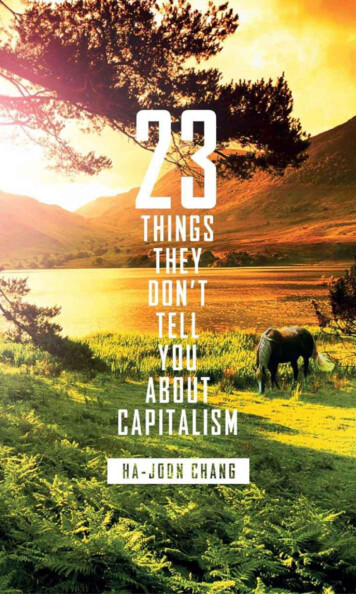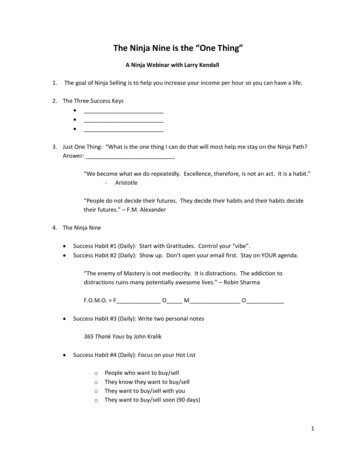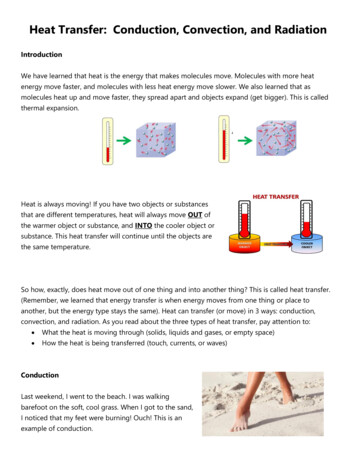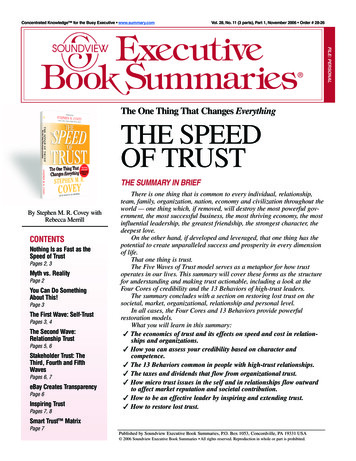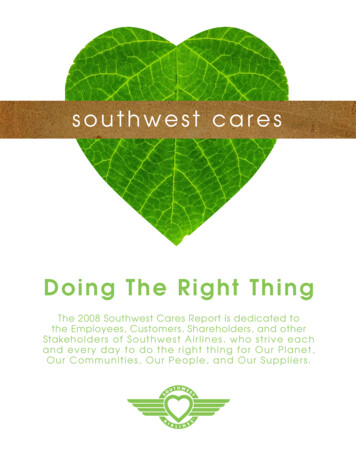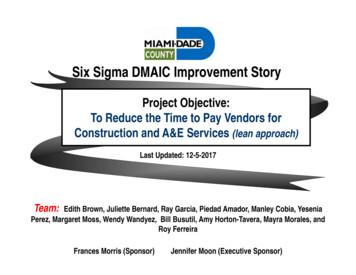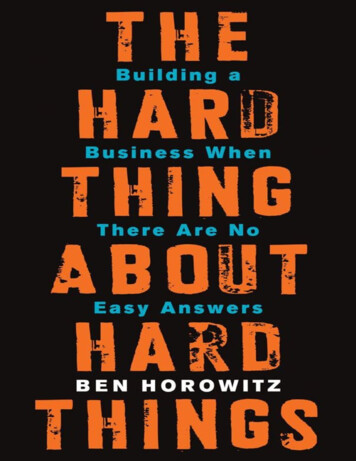
Transcription
CONTENTSDedicationIntroductionChapter 1: From Communist to Venture CapitalistChapter 2: “I Will Survive”Chapter 3: This Time with FeelingChapter 4: When Things Fall ApartThe StruggleCEOs Should Tell It Like It IsThe Right Way to Lay People OffPreparing to Fire an ExecutiveDemoting a Loyal FriendLies That Losers TellLead BulletsNobody CaresChapter 5: Take Care of the People, the Products, and the Profits—in That OrderA Good Place to WorkWhy Startups Should Train Their PeopleIs It Okay to Hire People from Your Friend’s Company?Why It’s Hard to Bring Big Company Execs into Little CompaniesHiring Executives: If You’ve Never Done the Job, How Do You HireSomebody Good?When Employees Misinterpret ManagersManagement DebtManagement Quality AssuranceChapter 6: Concerning the Going ConcernHow to Minimize Politics in Your CompanyThe Right Kind of Ambition
Titles and PromotionsWhen Smart People Are Bad EmployeesOld PeopleOne-on-OneProgramming Your CultureTaking the Mystery Out of Scaling a CompanyThe Scale Anticipation FallacyChapter 7: How to Lead Even When You Don’t Know Where You Are GoingThe Most Difficult CEO SkillThe Fine Line Between Fear and CourageOnes and TwosFollow the LeaderPeacetime CEO/Wartime CEOMaking Yourself a CEOHow to Evaluate CEOsChapter 8: First Rule of Entrepreneurship: There Are No RulesSolving the Accountability vs. Creativity ParadoxThe Freaky Friday Management TechniqueStaying GreatShould You Sell Your Company?Chapter 9: The End of the BeginningAppendix: Questions for Head of Enterprise Sales ForceAcknowledgmentsAbout the AuthorCreditsCopyrightAbout the Publisher
INTRODUCTION“This the real world, homie, school finishedThey done stole your dreams, you dunno who did it.”—KANYE WEST, “GORGEOUS”Every time I read a management or self-help book, I find myself saying, “That’sfine, but that wasn’t really the hard thing about the situation.” The hard thingisn’t setting a big, hairy, audacious goal. The hard thing is laying people offwhen you miss the big goal. The hard thing isn’t hiring great people. The hardthing is when those “great people” develop a sense of entitlement and startdemanding unreasonable things. The hard thing isn’t setting up an organizationalchart. The hard thing is getting people to communicate within the organizationthat you just designed. The hard thing isn’t dreaming big. The hard thing iswaking up in the middle of the night in a cold sweat when the dream turns into anightmare.The problem with these books is that they attempt to provide a recipe forchallenges that have no recipes. There’s no recipe for really complicated,dynamic situations. There’s no recipe for building a high-tech company; there’sno recipe for leading a group of people out of trouble; there’s no recipe formaking a series of hit songs; there’s no recipe for playing NFL quarterback;there’s no recipe for running for president; and there’s no recipe for motivatingteams when your business has turned to crap. That’s the hard thing about hardthings—there is no formula for dealing with them.Nonetheless, there are many bits of advice and experience that can help withthe hard things.I do not attempt to present a formula in this book. Instead, I present my storyand the difficulties that I have faced. As an entrepreneur, a CEO, and now as aventure capitalist, I still find these lessons useful—especially as I work with anew generation of founder-CEOs. Building a company inevitably leads to tough
times. I’ve been there; I’ve done that. Circumstances may differ, but the deeperpatterns and the lessons keep resonating.For the past several years, I’ve encapsulated these lessons in a series of blogposts that have been read by millions of people. Many of those have reached outto me wanting to know the backstory to the lessons. This book tells thatbackstory for the first time and includes the related lessons from the blog. I’vealso been inspired by many friends, advisers, and family members who havehelped me throughout my career and also by hip-hop/rap music. Because hiphop artists aspire to be both great and successful and see themselves asentrepreneurs, many of the themes—competing, making money, beingmisunderstood—provide insight into the hard things. I share my experiences inthe hope of providing clues and inspiration for others who find themselves in thestruggle to build something out of nothing.
— CHAPTER 1 —FROM COMMUNIST TO VENTURE CAPITALIST“This here is all aboutMy wife, my kids, the life that I liveThrough the night, I was his, it was right, but I didMy ups, and downs, my slips, my fallsMy trials and tribulations, my heart, my balls.”—DMX, “WHO WE BE”The other day I threw a big barbecue at my house and invited a hundred of myclosest friends. These types of gatherings aren’t unusual. My brother-in-law,Cartheu, and I have been barbecuing for years, and my skills have earned me thenickname from my African American friends “the Jackie Robinson ofBarbecue.” I crossed the color line.At this particular barbecue, the conversation turned to the great rapper Nas.My friend Tristan Walker, a young African American entrepreneur, commentedproudly that Nas was from his home project, Queensbridge, New York—one ofthe largest public housing projects in the United States. My seventy-three-yearold Jewish father interjected, “I’ve been to Queensbridge.” Convinced that therewas no way that my old, white father had been to Queensbridge, Tristan said,“You must mean Queens. Queensbridge is actually a housing project in anextremely rough neighborhood.” My father insisted: No, it was Queensbridge.I pointed out to Tristan that my father grew up in Queens, so he couldn’tpossibly be confused. Then I asked, “Dad, what were you doing inQueensbridge?” He replied, “I was passing out communist literature when I waseleven years old. I remember it well, because my mother got very upset that theCommunist Party sent me into the projects. She thought it was too dangerous fora little kid.”
My grandparents were actually card-carrying Communists. As an activemember in the Communist Party, my grandfather Phil Horowitz lost his job as aschoolteacher during the McCarthy era. My father was a red-diaper baby andgrew up indoctrinated in the philosophy of the left. In 1968, he moved ourfamily west to Berkeley, California, and became editor of the famed New Leftmagazine Ramparts.As a result, I grew up in the city affectionately known by its inhabitants as thePeople’s Republic of Berkeley. As a young child, I was incredibly shy andterrified of adults. When my mother dropped me off at nursery school for thefirst time, I began to cry. The teacher told my mother to just leave, whilereassuring her that crying was common among nursery school children. Butwhen Elissa Horowitz returned three hours later, she found me soaking wet andstill crying. The teacher explained that I hadn’t stopped, and now my clotheswere drenched as a result. I got kicked out of nursery school that day. If mymother hadn’t been the most patient person in the world, I might never havegone to school. When everybody around her recommended psychiatrictreatment, she was patient, willing to wait until I got comfortable with the world,no matter how long it took.When I was five years old, we moved from a one-bedroom house on GlenAvenue, which had become far too small for a six-person family, to a larger oneon Bonita Avenue. Bonita was middle-class Berkeley, which means something abit different from what one finds in most middle-class neighborhoods. The blockwas a collection of hippies, crazy people, lower-class people working hard tomove up, and upper-class people taking enough drugs to move down. One day,one of my older brother Jonathan’s friends, Roger (not his real name), was overat our house. Roger pointed to an African American kid down the block whowas riding in a red wagon. Roger dared me: “Go down the street, tell that kid togive you his wagon, and if he says anything, spit in his face and call him anigger.”A few things require clarification here. First, we were in Berkeley, so that wasnot common language. In fact, I had never heard the word nigger before anddidn’t know what it meant, though I guessed it wasn’t a compliment. Second,Roger wasn’t racist and he wasn’t raised in a bad home. His father was aBerkeley professor and both his parents were some of the nicest people in theworld, but we later found out that Roger suffered from schizophrenia, and hisdark side wanted to see a fight.Roger’s command put me in a difficult situation. I was terrified of Roger. I
thought that he would surely give me a severe beating if I didn’t follow hisinstructions. On the other hand, I was terrified of asking for the wagon. Hell, Iwas terrified of everything. I was much too scared of Roger to stay where I was,so I began walking down the block toward the other kid. The distance wasprobably thirty yards, but it felt like thirty miles. When I finally got there, Icould barely move. I did not know what to say, so I just opened my mouth andstarted talking. “Can I ride in your wagon?” is what came out. Joel Clark Jr. said,“Sure.” When I turned to see what Roger would do, he was gone. Apparently,his light side had taken over and he’d moved on to something else. Joel and Iwent on to play all day that day, and we’ve been best friends ever since.Eighteen years later, he would be the best man at my wedding.Until now, I’ve never told that story to anyone, but it shaped my life. It taughtme that being scared didn’t mean I was gutless. What I did mattered and woulddetermine whether I would be a hero or a coward. I have often thought back onthat day, realizing that if I’d done what Roger had told me to do, I would havenever met my best friend. That experience also taught me not to judge things bytheir surfaces. Until you make the effort to get to know someone or something,you don’t know anything. There are no shortcuts to knowledge, especiallyknowledge gained from personal experience. Following conventional wisdomand relying on shortcuts can be worse than knowing nothing at all.TURN YOUR SHIT INOver the years, I worked hard to avoid being influenced by first impressions andblindly adhering to convention. Growing up in Berkeley as an excellent studentin a town that frowned upon football as being too militaristic, I wasn’t expectedto join the Berkeley High School football team, but that’s what I did. This was abig step for me. I had not played in any of the peewee football leagues, so it wasmy first exposure to the sport. Nonetheless, those earlier lessons in dealing withfear helped me tremendously. In high school football, being able to handle fearis 75 percent of the game.I will never forget the first team meeting with head coach Chico Mendoza.Coach Mendoza was a tough old guy who had played college football at TexasChristian University, home of the mighty Horned Frogs. Coach Mendoza beganhis opening speech, “Some of you guys will come out here and you just won’t beserious. You’ll get here and start shooting the shit, talking shit, bullshittin’, notdoing shit, and just want to look good in your football shit. If you do that, thenyou know what? Turn your shit in.” He went on to elaborate on what was
unacceptable: “Come late to practice? Turn your shit in. Don’t want to hit? Turnyour shit in. Walk on the grass? Turn your shit in. Call me Chico? Turn your shitin.”It was the most intense, hilarious, poetic speech I’d ever heard. I loved it. Icouldn’t wait to get home and tell my mother. She was horrified, but I still lovedit. In retrospect, it was my first lesson in leadership. Former secretary of stateColin Powell says that leadership is the ability to get someone to follow youeven if only out of curiosity. I was certainly curious to see what Coach Mendozawould say next.I was the only kid on the football team who was also on the highest academictrack in math, so my teammates and I didn’t see each other in many classes. As aresult, I ended up moving in multiple social circles and hanging out with kidswith very different outlooks on the world. It amazed me how a diverseperspective utterly changed the meaning of every significant event in the world.For instance, when Run-D.M.C.’s Hard Times album came out, with itsrelentless bass drum, it sent an earthquake through the football team, but noteven a ripple through my calculus class. Ronald Reagan’s Strategic DefenseInitiative was considered an outrage among young scientists due to itsquestionable technical foundation, but those aspects went unnoticed at footballpractice.Looking at the world through such different prisms helped me separate factsfrom perception. This ability would serve me incredibly well later when Ibecame an entrepreneur and CEO. In particularly dire circumstances when the“facts” seemed to dictate a certain outcome, I learned to look for alternativenarratives and explanations coming from radically different perspectives toinform my outlook. The simple existence of an alternate, plausible scenario isoften all that’s needed to keep hope alive among a worried workforce.BLIND DATEIn the summer of 1986, I had finished my sophomore year of college atColumbia University, and I was staying with my father, who was now living inLos Angeles. I had been set up on a blind date by my friend and high schoolfootball teammate Claude Shaw. Claude and I got ready for the double date withhis girlfriend, Jackie Williams, and my date, Felicia Wiley, by preparing anelaborate dinner. We meticulously planned and cooked all day and had the entiremeal, including four perfectly presented T-bone steaks, ready at 7 p.m.—datetime. But there were no dates. An hour passed, but we didn’t get too worked up.
Jackie was known for her tardiness, so no worries. Then two hours passed, andClaude called for a status check. I listened in shock as I looked over the nowcold gourmet meal that we’d prepared. My date, Felicia, had decided that shewas “too tired” to show up for the date. Wow. How obnoxious!I told Claude to hand me the phone. I introduced myself: “Hi, this is Ben, yourblind date.”Felicia: “I am sorry, but I am tired and it is late.”Me: “Well, it is late, because you are late.”Felicia: “I know, but I am just too tired to come over.”At this point I decided to appeal to her sense of empathy.Me: “Well, I understand your predicament, but the time to communicate thismessage would have been before we spent all day cooking dinner. At this point,anything short of getting into your car and driving here immediately would berude and leave a permanently poor impression.”If she was totally self-centered (as she appeared to be), my plea would haveno effect, and I would be better off missing the date. On the other hand, if shedidn’t want to go out like that, then there might be something there.Felicia: “Okay, I’ll come over.”Ninety minutes later she arrived wearing white shorts and looking as pretty ascan be. In all my focus and anticipation about the date, I had completelyforgotten about the fistfight I’d been in the day before. During a pickupbasketball game in the San Fernando Valley, a six-foot-two-inch, crew-cutsporting, camouflage-pants-wearing, fraternity-boy-looking player threw the ballat my brother. Jonathan was a musician, had long hair, and probably weighedabout 155 pounds at the time. On the other hand, I was used to football andfighting and was ready for action. I judged the situation on my first impression,and I rushed the frat boy. A scuffle ensued. I landed some good punches butcaught a right hook under my left eye, leaving a bit of a mark. It’s possible thatmy target player was simply mad about a hard foul rather than trying to bully mybrother, but that’s the price of not taking the time to understand. I will neverknow.Whatever the case, when I opened the door to greet our dates, Felicia’s awardwinning green eyes immediately fixed on the welt under my eye. Her firstimpression (told to me years later): “This guy is a thug. Coming here was a bigmistake.”Fortunately, neither of us relied on our first impressions. We have beenhappily married for nearly twenty-five years and have three wonderful children.
SILICON VALLEYDuring one summer in college, I got a job as an engineer at a company calledSilicon Graphics (SGI). The experience blew my mind. The company inventedmodern computer graphics and powered a whole new class set of applicationsranging from the movie Terminator 2 to amazing flight simulators. Everybodythere was so smart. The things they built were so cool. I wanted to work forSilicon Graphics for the rest of my life.After graduating from college and graduate school in computer science, I wentback to work for SGI. Being there was a dream come true and I loved it. Aftermy first year at SGI, I met a former head of marketing for the company, RoselieBuonauro, who had a new startup. Roselie had heard about me from herdaughter, who also worked with me at SGI. Roselie recruited me hard.Eventually, she got me and I went to work for her at NetLabs.Joining NetLabs turned out to be a horrible decision for me. The company wasrun by Andre Schwager, a former Hewlett-Packard executive, and moreimportant, Roselie’s husband. Andre and Roselie had been brought in by theventure capitalists as the “professional management team.” Unfortunately, theyunderstood very little about the products or the technology, and they sent thecompany off in one crazy direction after the next. This was the first time that Istarted to understand the importance of founders running their companies.To make matters more complicated, my second daughter, Mariah, had beendiagnosed with autism, which made working at a startup a terrible burden for ourfamily, as I needed to spend more time at home.One very hot day my father came over for a visit. We could not afford airconditioning, and all three children were crying as my father and I sat theresweating in the 105-degree heat.My father turned to me and said, “Son, do you know what’s cheap?”Since I had absolutely no idea what he was talking about, I replied, “No,what?”“Flowers. Flowers are really cheap. But do you know what’s expensive?” heasked.Again, I replied, “No, what?”He said, “Divorce.”Something about that joke, which was not really a joke, made me realize that Ihad run out of time. Up until that point, I had not really made any seriouschoices. I felt like I had unlimited bandwidth and could do everything in life that
I wanted to do simultaneously. But his joke made it suddenly clear that bycontinuing on the course I was on, I might lose my family. By doing everything,I would fail at the most important thing. It was the first time that I forced myselfto look at the world through priorities that were not purely my own. I thoughtthat I could pursue my career, all my interests, and build my family. Moreimportant, I always thought about myself first. When you are part of a family orpart of a group, that kind of thinking can get you into trouble, and I was in deeptrouble. In my mind, I was confident that I was a good person and not selfish,but my actions said otherwise. I had to stop being a boy and become a man. Ihad to put first things first. I had to consider the people who I cared about mostbefore considering myself.I decided to quit NetLabs the next day. I found a job at Lotus Developmentthat would allow me to get my home life straightened out. I stopped thinkingabout myself and focused on what was best for my family. I started being theperson that I wanted to be.NETSCAPEOne day while working at Lotus, one of my coworkers showed me a newproduct called Mosaic, which was developed by some students at the Universityof Illinois. Mosaic was essentially a graphical interface to the Internet—atechnology formerly only used by scientists and researchers. It amazed me. Itwas so obviously the future, and I was so obviously wasting my time working onanything but the Internet.Several months later, I read about a company called Netscape, which had beencofounded by former Silicon Graphics founder Jim Clark and Mosaic inventorMarc Andreessen. I instantly decided that I should interview for a job there. Icalled a friend who worked at Netscape and asked if he could get me aninterview with the company. He obliged and I was on my way.During the first interviews, I met everyone on the product management team. Ithought the meetings went well, but when I arrived home that evening Feliciawas in tears. The Netscape recruiter had called me to give me some tips, andFelicia had answered. (This was before the days of pervasive cell phones.) Therecruiter informed her that it would be unlikely I’d get the job, because the groupwas looking for candidates with Stanford or Harvard MBAs. Felicia suggestedthat maybe I could go back to school. Given that we had three children, sheknew this was unrealistic, hence the tears. I explained that recruiters were nothiring managers, and that they might consider me despite my lack of proper
business schooling.The next day the hiring manager called back to let me know that they wantedme to interview with cofounder and Chief Technical Officer Marc Andreessen.He was twenty-two years old at the time.In retrospect, it’s easy to think both the Web browser and the Internet wereinevitable, but without Marc’s work, it is likely that we would be living in a verydifferent world. At the time most people believed only scientists and researcherswould use the Internet. The Internet was thought to be too arcane, insecure, andslow to meet real business needs. Even after the introduction of Mosaic, theworld’s first browser, almost nobody thought the Internet would be significantbeyond the scientific community—least of all the most important technologyindustry leaders, who were busy building proprietary alternatives. Theoverwhelming favorites to dominate the race to become the so-calledInformation Superhighway were competing proprietary technologies fromindustry powerhouses such as Oracle and Microsoft. Their stories captured theimagination of the business press. This was not so illogical, since mostcompanies didn’t even run TCP/IP (the software foundation for the Internet)—they ran proprietary networking protocols such as AppleTalk, NetBIOS, andSNA. As late as November 1995, Bill Gates wrote a book titled The RoadAhead, in which he predicted that the Information Superhighway—a networkconnecting all businesses and consumers in a world of frictionless commerce—would be the logical successor to the Internet and would rule the future. Gateslater went back and changed references from the Information Superhighway tothe Internet, but that was not his original vision.The implications of this proprietary vision were not good for business or forconsumers. In the minds of visionaries like Bill Gates and Larry Ellison, thecorporations that owned the Information Superhighway would tax everytransaction by charging a “vigorish,” as Microsoft’s then–chief technologyofficer, Nathan Myhrvold, referred to it.It’s difficult to overstate the momentum that the proprietary InformationSuperhighway carried. After Mosaic, even Marc and his cofounder, Jim Clark,originally planned a business for video distribution to run on top of theproprietary Information Superhighway, not the Internet. It wasn’t until deep intothe planning process that they decided that by improving the browser to make itsecure, more functional, and easier to use, they could make the Internet thenetwork of the future. And that became the mission of Netscape—a mission thatthey would gloriously accomplish.
Interviewing with Marc was like no other job interview I’d ever had. Gonewere questions about my résumé, my career progression, and my work habits.He replaced them with a dizzying inquiry into the history of email, collaborationsoftware, and what the future might hold. I was an expert in the topic, becauseI’d spent the last several years working on the leading products in the category,but I was shocked by how much a twenty-two-year-old kid knew about thehistory of the computer business. I’d met many really smart young people in mycareer, but never a young technology historian. Marc’s intellect and instinctstook me aback, but beyond Marc’s historical knowledge, his insights abouttechnologies such as replication were incisive and on point. After the interview, Iphoned my brother and told him that I’d just interviewed with Marc Andreessen,and I thought that he might be the smartest person I’d ever met.A week later, I got the job. I was thrilled. I didn’t really care what the offerwas. I knew that Marc and Netscape would change the world, and I wanted to bepart of it. I could not wait to get started.Once at Netscape, I was put in charge of their Enterprise Web Server productline. The line consisted of two products: the regular Web server, which listed for 1,200, and the secure Web server (a Web server that included the then brandnew security protocol invented by Netscape called SSL, Secure Sockets Layer)for 5,000. At the time that I joined, we had two engineers working on the Webservers: Rob McCool, who had invented the NCSA Web server, and his twinbrother, Mike McCool.By the time Netscape went public in August 1995, we had grown the Webserver team to about nine engineers. The Netscape initial public offering (IPO)was both spectacular and historic. The stock initially priced at 14 per share, buta last-minute decision doubled the initial offering to 28 per share. It spiked to 75—nearly a record for a first-day gain—and closed at 58, giving Netscape amarket value of nearly 3 billion on the day of the IPO. More than that, the IPOwas an earthquake in the business world. As my friend and investment bankerFrank Quattrone said at the time, “No one wanted to tell their grandchildren thatthey missed out on this one.”The deal changed everything. Microsoft had been in business for more than adecade before its IPO; we’d been alive for sixteen months. Companies began toget defined as “new economy” or as “old economy.” And the new economy waswinning. The New York Times called the Netscape IPO “world-shaking.”But there was a crack in our armor: Microsoft announced that it would bebundling its browser, Internet Explorer, with its upcoming breakthrough
operating system release, Windows 95—for free. This posed a huge problem toNetscape, because nearly all of our revenue came from browser sales, andMicrosoft controlled more than 90 percent of operating systems. Our answer toinvestors: We would make our money on Web servers.Two months later, we got our hands on an early release of Microsoft’supcoming Web server Internet Information Server (IIS). We deconstructed IISand found that it had every feature that we had—including the security in ourhigh-end product—and was five times faster. Uh-oh. I figured that we had aboutfive months before Microsoft released IIS to solve the problem or else we wouldbe toast. In the “old economy,” product cycles typically took eighteen months tocomplete, so this was an exceptionally short time frame even in the “neweconomy.” So I went to see our department head, Mike Homer.With the possible exception of Marc, Mike Homer was the most significantcreative force behind Netscape. More important, the worse a situation became,the stronger Mike would get. During particularly brutal competitive attacks,most executives would run from the press. Mike, on the other hand, was alwaysfront and center. When Microsoft unveiled its famous “embrace and extend”strategy—a dramatic pivot to attack Netscape—Mike took every phone call,sometimes even talking to two reporters at once with a phone in each hand. Hewas the ultimate warrior.Mike and I spent the next several months developing a comprehensive answerto Microsoft’s threat. If they were going to give our products away, then wewere going to offer a dirt-cheap, open alternative to the highly expensive andproprietary Microsoft BackOffice product line. To do so, we acquired twocompanies, which provided us with a competitive alternative to MicrosoftExchange. We then cut a landmark deal with the database company Informix toprovide us unlimited relational database access through the Web for 50 a copy,which was literally hundreds of times less than Microsoft charged. Once weassembled the entire package, Mike named it Netscape SuiteSpot, as it would bethe “suite” that displaced Microsoft’s BackOffice. We lined everything up for amajor launch on March 5, 1996, in New York.Then, just two weeks before the launch, Marc, without telling Mike or me,revealed the entire strategy to the publication Computer Reseller News. I waslivid. I immediately sent him a short email:To: Marc AndreessenCc: Mike Homer
From: Ben HorowitzSubject : LaunchI guess we’re not going to wait until the 5th to launch the strategy.— BenWithin fifteen minutes, I received the following reply.To: Ben HorowitzCc: Mike Homer, Jim Barksdale (CEO), Jim Clark (Chairman)From: Marc AndreessenSubject: Re: LaunchApparently you do not understand how serious the situation is. We aregetting killed killed killed out there. Our current product is radically worsethan the competition. We’ve had nothing to say for months. As a result,we’ve lost over 3B in market capitalization. We are now in danger oflosing the entire company and it’s all server product management’s fault.Next time do the fucking interview yourself.Fuck you,MarcI received this email the same day that Marc appeared barefoot and sitting ona throne on the cover of Time magazine. When I first saw the cover, I feltthrilled. I had never met anyone in my life who had been on the cover of Time.Then I felt sick. I brought both the magazine and the email home to Felicia to geta second opinion. I was very worried. I was twenty-nine years old, had a wifeand three children, and needed my job. She looked at the email and the magazinecover and said, “You need to start looking for a job right away.”In the end, I didn’t get fired and over the next two years, SuiteSpot grew
The hard thing isn’t hiring great people. The hard thing is when those “great people” develop a sense of entitlement and start demanding unreasonable things. The hard thing isn’t setting up an organizational chart. The hard thing is getting people to communicate within the organization that you
